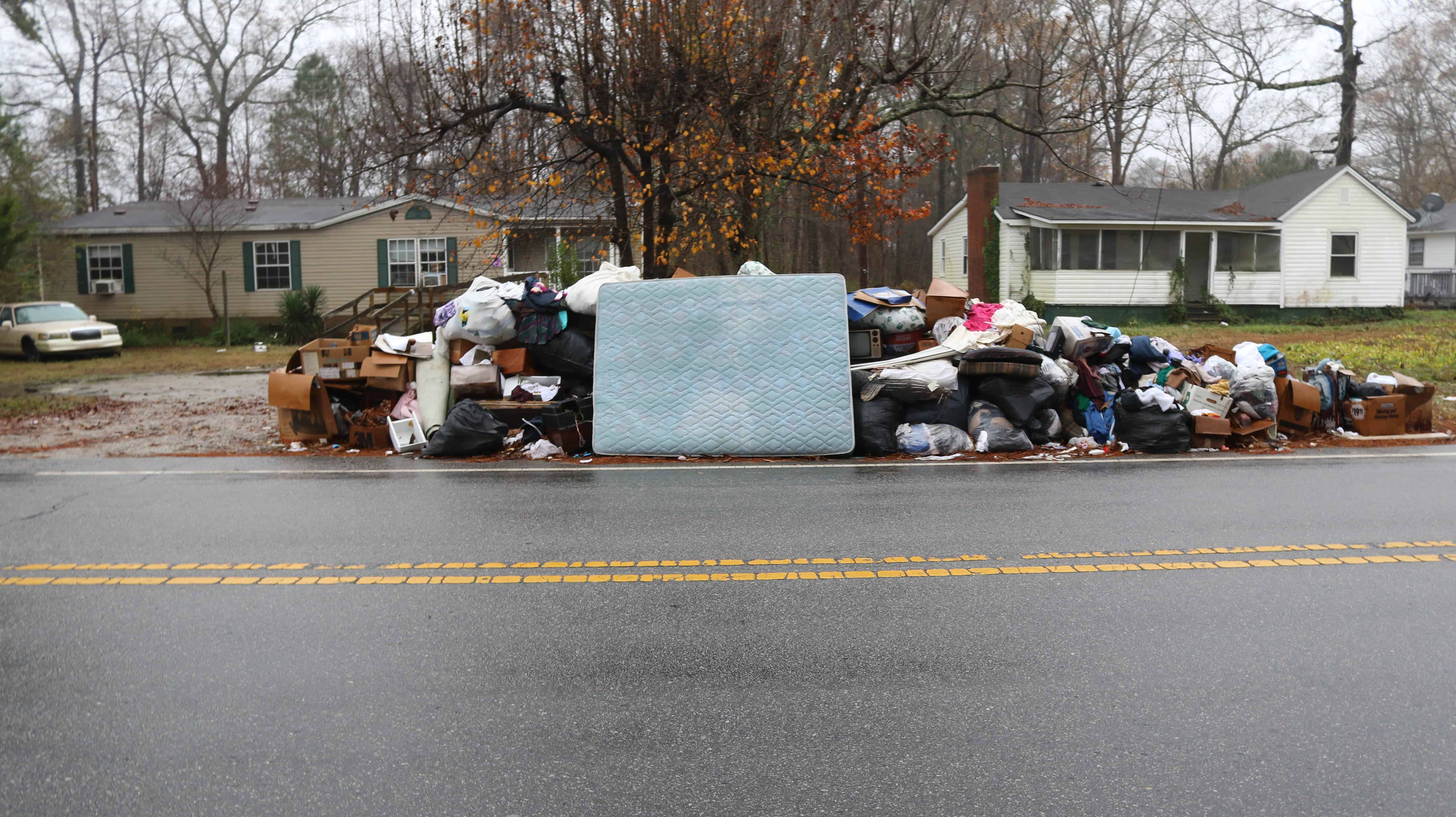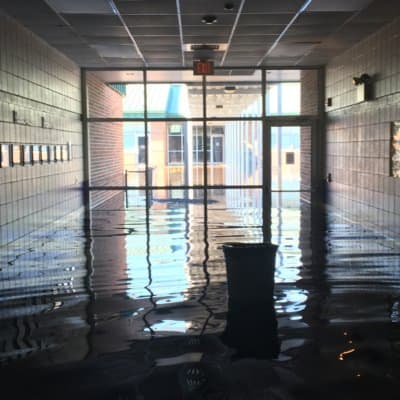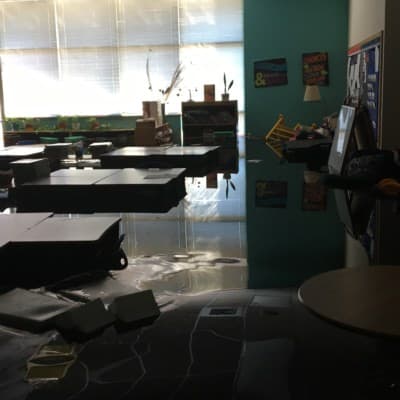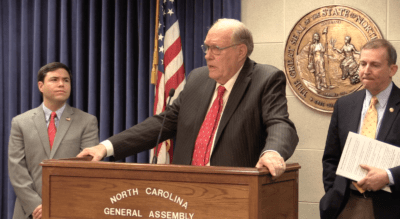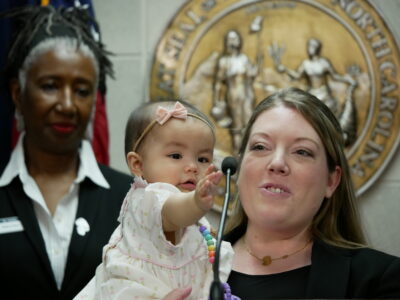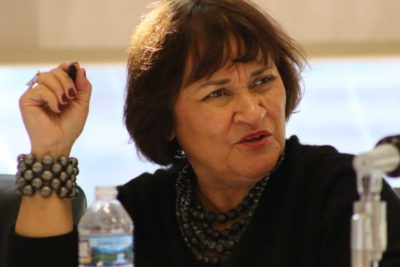During John Farrelly’s time as superintendent of Edgecombe County Public Schools (ECPS) — since 2012 — he’s learned to expect anything.
But then he found himself on a boat with the National Guard, floating through the streets, homes, and classrooms of Princeville. Seeing Hurricane Matthew’s damage, Farrelly said, is something he never could have expected or imagined. He took these pictures of Princeville Elementary School from the boat that day.
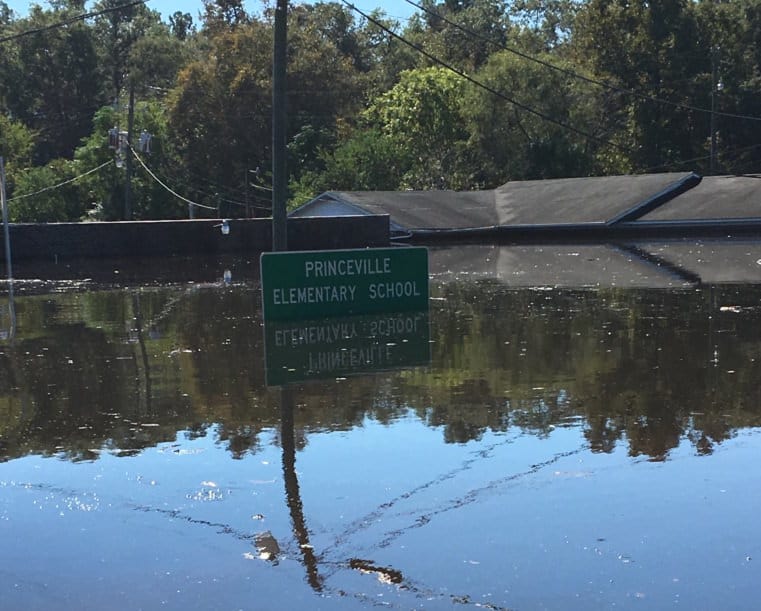
Several weeks after the storm hit eastern North Carolina and the floodwaters filled Princeville, Farrelly said the biggest challenge has been seeing the hardship community members continue to endure. He said it’s been difficult to get to work while remaining sensitive to the realities of students and their families.
“It’s finding a balance between still needing to function as a school system and, at the same time, knowing that we’ve got community members who’ve just been ravished with absolute despair in many cases,” Farrelly said. “It’s been quite an experience.”
The first step was getting Princeville Elementary students back to school. That happened in about three weeks, in a completely different building in nearby Tarboro. Farrelly shared the story of how that building — known in town as the Bridgers building and previously used as ECPS office space — opened up at the perfect time, calling it “a God-send.” The Barnhill family, known for their N.C.-based construction company, donated the $1.5 million building that is now Edgecombe County Public Schools’ central office about a year and a half ago. That meant offices that were in the Bridgers building could be moved to the new one, and renovations could happen in the Bridgers building — all in time for Princeville Elementary to need a new space. Bridgers has 12 classrooms, the same number Princeville Elementary had, and it’s in a good location, Farrelly said.
“It’s not been absolutely perfect, but all things considered, we’re fortunate to have that facility flexibility.”
Stories like this one — of things falling into place, of the community showing up in big ways — are what Farrelly said has reassured him, amid struggle, that he is where he is supposed to be. He said he has been reminded in the last several weeks that Edgecombe County is a uniquely caring place, a great place to raise kids, a place with a unified spirit.
“I’m one of 50,000 residents that live in Edgecombe County,” Farrelly said. “I try to do what others do — try to do the right things for each other.”
After getting students back to school, the process started of meeting kids where they are. Buses were run to hotels and shelters. Several rooms in the central office and, more recently, space at the old shopping mall were turned into donation centers, which were flooded with materials from across the state and country. Now, Farrelly said, they’re working with the Tarboro Town Council, who owns the land where the Bridgers building sits, to build a playground on campus and put a mobile unit to serve food to families.
Agencies within the community and across local, state, and federal levels of government, Farrelly said, have worked together well. When EducationNC spoke with Farrelly, FEMA had yet to give a final say on what was next for Princeville Elementary’s flooded building. So far, everything has been funded locally, with the plan of leaning on state and federal funding and insurance to reimburse the school system. The special session that Governor Pat McCrory has called for this week will determine where state dollars go for Hurricane Matthew relief.
As the recovery process continues, Farrelly has a plan to move the community forward. A couple months back, before Hurricane Matthew, Farrelly said he had an idea that he has just been able to circle back to. He is currently assembling a commission that will consist of around 15 education stakeholders — parents, students, teachers, administrators, faith-based leaders, and public officials.
From January to May, the Blue Ribbon Commission on Educational Equity will hold meetings to address issues — both educational and social — that need to be confronted. He hopes four or five town hall-style events will give residents the space they need to express themselves and discuss what they want for Edgecombe’s youth and what they want for their community.
Farrelly has picked a few key issues to drive the conversations: educational equity, equitable funding, school readiness, literacy, and talent.
He pinned recruiting and retaining talent in teachers and education leaders as one of the biggest challenges rural North Carolina faces — that the system’s ability to compete with bigger cities is hindered by what they can offer educators.
“If we’re going to level the playing field in competitiveness, we’ve got to look at local supplements,” Farrelly said. When a teacher can drive an hour west and get a considerably better deal, Farrelly said, it’s not fair.
But Farrelly expects underlying social issues to be a necessary part of these conversations as well. When talking about school readiness or literacy, for example, Farrelly said poverty and racism can’t be ignored.
“Part of the intent is to have real conversations about where we are as a community,” he said. “As education leaders, we have a responsibility to talk about real issues.”
That could mean frustration and devastation from those who just lost their homes. That could mean sticky conversations about problems that have been around way before the storm.
“Racism and oppression are certainly two issues that not a lot of people want to talk about because it gets uncomfortable, but I think it impacts our children and our community,” Farrelly said. “I’m a 50-year-old, middle-class Caucasian, and God knows that I’ve not had any level of suffering in my life compared to what’s gone on historically in the black community. But it doesn’t mean that I can’t recognize how it’s impacted kids.”
The input, no matter how uncomfortable, is crucial to Farrelly. He said a big reason any of his work has been successful in the past — like when he was bringing a global approach to the school system — is because of having real conversations with as many residents as possible. The input from the events will be used when creating the district-wide strategic plan.
Farrelly said, as he has spent more and more time in his role, he has been able to see a broader picture of what education encompasses. What students come to school with and what they leave and go home to affect what happens at school, he said. Leaving the community out of the school system just doesn’t make sense.
“If we can impact the community, then that’s going to impact schools, that’s going to impact kids and their lives.”
In a way, Farrelly said, the decisions Princeville and Edgecombe County face are theirs to solve together.
“It’s not a Pat McCrory decision to rebuild Princeville,” Farrelly said. “It’s not a John Farrelly decision to rebuild the Princeville Elementary School. It’s a community decision.”
